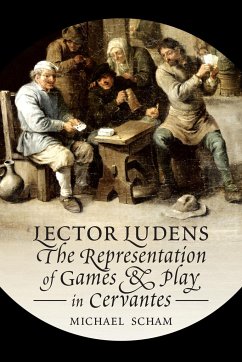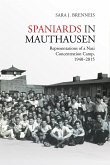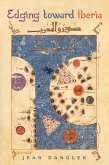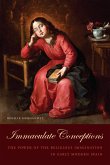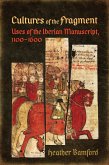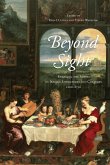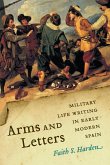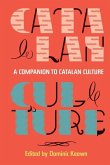- Gebundenes Buch
- Merkliste
- Auf die Merkliste
- Bewerten Bewerten
- Teilen
- Produkt teilen
- Produkterinnerung
- Produkterinnerung
Michael Scham uses Cervantes’s Don Quijote and Novelas ejemplares as the basis for a wide-ranging exploration of early modern Spanish views on recreations ranging from cards and dice to hunting, attending the theater, and reading fiction.
Andere Kunden interessierten sich auch für
![Spaniards in Mauthausen Spaniards in Mauthausen]() Sara J BrenneisSpaniards in Mauthausen116,99 €
Sara J BrenneisSpaniards in Mauthausen116,99 €![Edging Toward Iberia Edging Toward Iberia]() Jean DanglerEdging Toward Iberia82,99 €
Jean DanglerEdging Toward Iberia82,99 €![Immaculate Conceptions Immaculate Conceptions]() Rosilie HernándezImmaculate Conceptions95,99 €
Rosilie HernándezImmaculate Conceptions95,99 €![Cultures of the Fragment Cultures of the Fragment]() Heather BamfordCultures of the Fragment91,99 €
Heather BamfordCultures of the Fragment91,99 €![Beyond Sight Beyond Sight]() Beyond Sight91,99 €
Beyond Sight91,99 €![Arms and Letters Arms and Letters]() Faith S HardenArms and Letters70,99 €
Faith S HardenArms and Letters70,99 €![A Companion to Catalan Culture A Companion to Catalan Culture]() A Companion to Catalan Culture120,99 €
A Companion to Catalan Culture120,99 €-
-
-
Michael Scham uses Cervantes’s Don Quijote and Novelas ejemplares as the basis for a wide-ranging exploration of early modern Spanish views on recreations ranging from cards and dice to hunting, attending the theater, and reading fiction.
Hinweis: Dieser Artikel kann nur an eine deutsche Lieferadresse ausgeliefert werden.
Hinweis: Dieser Artikel kann nur an eine deutsche Lieferadresse ausgeliefert werden.
Produktdetails
- Produktdetails
- Verlag: University of Toronto Press
- Seitenzahl: 400
- Erscheinungstermin: 17. September 2014
- Englisch
- Abmessung: 235mm x 167mm x 31mm
- Gewicht: 744g
- ISBN-13: 9781442648647
- ISBN-10: 1442648643
- Artikelnr.: 40789129
- Herstellerkennzeichnung
- Libri GmbH
- Europaallee 1
- 36244 Bad Hersfeld
- gpsr@libri.de
- Verlag: University of Toronto Press
- Seitenzahl: 400
- Erscheinungstermin: 17. September 2014
- Englisch
- Abmessung: 235mm x 167mm x 31mm
- Gewicht: 744g
- ISBN-13: 9781442648647
- ISBN-10: 1442648643
- Artikelnr.: 40789129
- Herstellerkennzeichnung
- Libri GmbH
- Europaallee 1
- 36244 Bad Hersfeld
- gpsr@libri.de
Michael Scham is an associate professor of Spanish at the University of St Thomas in Minnesota.
Acknowledgments
List of Illustrations
Introduction
1. Leisure and Recreation in Early Modern Spain
* Theoretical Contexts
* Prerational and Rational Play in the Epic, the Picaresque, and the
Quixotic
* The Space and Function of Eutrapelia
* Cristóbal Méndez, Rodrigo Caro, Fray Alonso Remon: Therapeutic
Exercise
* Human Divinity and Depravity: Vives, Erasmus, Montaigne
* Play types in Golden Age Spain
* Chess
* Games of Chance
* Physical activity and competition
* Mimesis
* Ilinx
* Regulating play in the Indias
2. Solitary, Collaborative and Complicit Play in Don Quijote
* Cervantes and the Ambivalent Freedom of Play
* Players and Games in Don Quijote
* Play and Laughter in Don Quijote
* Laughing At, Laughing With
* Comic Doubt and Delusion in Don Quijote
* Ludic Scepticism in Don Quijote II
3. The Novelas ejemplares: Ocio, Exemplarity, and Community
* Agonistic and Restrictive Play in El licenciado Vidriera
* The Agonistic Intellect: Cruel Comedy and Vidriera’s Humourless
Vision
* The Picaresque and Play in El coloquio de los perros
* Play and the Liminal Underworld Experience
* Dialogue and the Digressive Quest for Meaning in El coloquio de los
perros
* Play and the Exemplarity of Process
* Picaresque Freedom and Festive Play
* The Festive Mode of the Picaresque
* Monipodio’s Criminal and Ludic Community in Rinconete y Cortadillo
* Distance, Morality, and the Allure of the Aesthetic Experience
* Generic Interplay in La ilustre fregona
* Interrogation and Validation of the Fictional World
Conclusion
Notes
Bibliography
List of Illustrations
Introduction
1. Leisure and Recreation in Early Modern Spain
* Theoretical Contexts
* Prerational and Rational Play in the Epic, the Picaresque, and the
Quixotic
* The Space and Function of Eutrapelia
* Cristóbal Méndez, Rodrigo Caro, Fray Alonso Remon: Therapeutic
Exercise
* Human Divinity and Depravity: Vives, Erasmus, Montaigne
* Play types in Golden Age Spain
* Chess
* Games of Chance
* Physical activity and competition
* Mimesis
* Ilinx
* Regulating play in the Indias
2. Solitary, Collaborative and Complicit Play in Don Quijote
* Cervantes and the Ambivalent Freedom of Play
* Players and Games in Don Quijote
* Play and Laughter in Don Quijote
* Laughing At, Laughing With
* Comic Doubt and Delusion in Don Quijote
* Ludic Scepticism in Don Quijote II
3. The Novelas ejemplares: Ocio, Exemplarity, and Community
* Agonistic and Restrictive Play in El licenciado Vidriera
* The Agonistic Intellect: Cruel Comedy and Vidriera’s Humourless
Vision
* The Picaresque and Play in El coloquio de los perros
* Play and the Liminal Underworld Experience
* Dialogue and the Digressive Quest for Meaning in El coloquio de los
perros
* Play and the Exemplarity of Process
* Picaresque Freedom and Festive Play
* The Festive Mode of the Picaresque
* Monipodio’s Criminal and Ludic Community in Rinconete y Cortadillo
* Distance, Morality, and the Allure of the Aesthetic Experience
* Generic Interplay in La ilustre fregona
* Interrogation and Validation of the Fictional World
Conclusion
Notes
Bibliography
Acknowledgments
List of Illustrations
Introduction
1. Leisure and Recreation in Early Modern Spain
* Theoretical Contexts
* Prerational and Rational Play in the Epic, the Picaresque, and the
Quixotic
* The Space and Function of Eutrapelia
* Cristóbal Méndez, Rodrigo Caro, Fray Alonso Remon: Therapeutic
Exercise
* Human Divinity and Depravity: Vives, Erasmus, Montaigne
* Play types in Golden Age Spain
* Chess
* Games of Chance
* Physical activity and competition
* Mimesis
* Ilinx
* Regulating play in the Indias
2. Solitary, Collaborative and Complicit Play in Don Quijote
* Cervantes and the Ambivalent Freedom of Play
* Players and Games in Don Quijote
* Play and Laughter in Don Quijote
* Laughing At, Laughing With
* Comic Doubt and Delusion in Don Quijote
* Ludic Scepticism in Don Quijote II
3. The Novelas ejemplares: Ocio, Exemplarity, and Community
* Agonistic and Restrictive Play in El licenciado Vidriera
* The Agonistic Intellect: Cruel Comedy and Vidriera’s Humourless
Vision
* The Picaresque and Play in El coloquio de los perros
* Play and the Liminal Underworld Experience
* Dialogue and the Digressive Quest for Meaning in El coloquio de los
perros
* Play and the Exemplarity of Process
* Picaresque Freedom and Festive Play
* The Festive Mode of the Picaresque
* Monipodio’s Criminal and Ludic Community in Rinconete y Cortadillo
* Distance, Morality, and the Allure of the Aesthetic Experience
* Generic Interplay in La ilustre fregona
* Interrogation and Validation of the Fictional World
Conclusion
Notes
Bibliography
List of Illustrations
Introduction
1. Leisure and Recreation in Early Modern Spain
* Theoretical Contexts
* Prerational and Rational Play in the Epic, the Picaresque, and the
Quixotic
* The Space and Function of Eutrapelia
* Cristóbal Méndez, Rodrigo Caro, Fray Alonso Remon: Therapeutic
Exercise
* Human Divinity and Depravity: Vives, Erasmus, Montaigne
* Play types in Golden Age Spain
* Chess
* Games of Chance
* Physical activity and competition
* Mimesis
* Ilinx
* Regulating play in the Indias
2. Solitary, Collaborative and Complicit Play in Don Quijote
* Cervantes and the Ambivalent Freedom of Play
* Players and Games in Don Quijote
* Play and Laughter in Don Quijote
* Laughing At, Laughing With
* Comic Doubt and Delusion in Don Quijote
* Ludic Scepticism in Don Quijote II
3. The Novelas ejemplares: Ocio, Exemplarity, and Community
* Agonistic and Restrictive Play in El licenciado Vidriera
* The Agonistic Intellect: Cruel Comedy and Vidriera’s Humourless
Vision
* The Picaresque and Play in El coloquio de los perros
* Play and the Liminal Underworld Experience
* Dialogue and the Digressive Quest for Meaning in El coloquio de los
perros
* Play and the Exemplarity of Process
* Picaresque Freedom and Festive Play
* The Festive Mode of the Picaresque
* Monipodio’s Criminal and Ludic Community in Rinconete y Cortadillo
* Distance, Morality, and the Allure of the Aesthetic Experience
* Generic Interplay in La ilustre fregona
* Interrogation and Validation of the Fictional World
Conclusion
Notes
Bibliography

